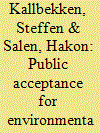| Srl | Item |
| 1 |
ID:
104979


|
|
|
|
|
| Publication |
2011.
|
| Summary/Abstract |
While strongly recommended by economists, it has often been politically difficult to impose taxes on externalities. There is a substantial literature on public attitudes towards environmental taxes. There has, however, been few comprehensive attempts to understand attitudes towards environmental taxes.
The main research question in this paper is which factors influence support for fuel taxation. We propose a model of attitudes towards fuel taxation, and test this model as well as more specific hypotheses, using data from a representative survey of the adult Norwegian population.
Our results suggest that support for fuel taxation is best predicted by beliefs about environmental consequences, followed by beliefs about consequences to others. Beliefs about consequences to self (self-interest) is the factor that explains the least variation in support for fuel taxation.
The academically interesting result that support cannot be well explained without capturing a broad range of motivational factors is also highly policy relevant. It implies that there is no magic formula for increasing public support for environmental taxes. There are, however, some issues which can be addressed: trust in how well the government spends the revenue, and the perception that taxation does very little to change behaviour and thus to reduce environmental problems.
|
|
|
|
|
|
|
|
|
|
|
|
|
|
|
|
| 2 |
ID:
091535


|
|
|
|
|
| Publication |
2009.
|
| Summary/Abstract |
This paper examines the effects of replacing current fuel taxes by a system of taxes that account better for all the different external costs of the different transport modes. One of the important implications of this reform is that current fuel taxes are decreased to a level of 80 euro/ton of CO2 but that the mileage related taxes on car and truck use increase. Using the TREMOVE model for the transport sector of 31 European countries, one finds that the volume of transport will decrease because current taxes on transport are too low compared to overall external costs. Overall CO2 emissions will decrease slightly. Using the MARKAL-TIMES model for the Belgian energy sector, putting all sectors and technologies on equal footing shows that a fuel tax reform makes that it is not cost efficient to require large CO2 emission reductions in the transport sector and that traditional car technologies will continue to dominate the car market in 2020-2030.
|
|
|
|
|
|
|
|
|
|
|
|
|
|
|
|
| 3 |
ID:
098536


|
|
|
|
|
| Publication |
2010.
|
| Summary/Abstract |
Hydrogen is one of the alternative transport fuels expected to replace conventional oil based fuels. The paper finds that it is possible for non-fossil-based hydrogen to become the lowest cost fuel without favourable tax treatment. The order of per kilometre cost depends on performance in hydrogen production, the international oil price, and fuel taxes. At low oil prices, the highest per kilometre costs were found for non-fossil power-based hydrogen, the second highest for natural gas-based hydrogen, and the lowest for conventional fuels. At high oil prices, this ranking is reversed and non-fossil power-based hydrogen becomes the most cost competitive fuel. General fuel taxes lower the threshold at which the international oil price reverses this competitiveness order. The highest fuel tax rates applied in Europe lowers this threshold oil price considerably, whereas the lowest fuel taxes may be insufficient to make hydrogen competitive without tax favours. Alternative adjustments of the EU minimum fuel tax rates with a view to energy efficiency and CO2-emissions are discussed.
|
|
|
|
|
|
|
|
|
|
|
|
|
|
|
|